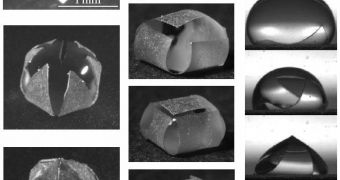Plastics sheets can be turned into different shapes to serve industrial purposes, but they do not revert to their original state (plasticity is a property of a material to undergo a non-reversible change of shape in response to an applied force), and they definitely do not change shape by themselves.
At least until now, they didn't.
Jos? Bico and colleagues at the Ecole Sup?rieure de Physique et de Chimie Industrielles (ESPCI), in Paris, together with a team from the Paris Institute of Technology have shown that water droplets can be used to make flat shapes fold up to create more complex 3D structures.
Tiny pyramids, boxes and spheres are created when water is added to flat plastic shapes just a couple of millimeters across, with no human intervention whatsoever. As a droplet evaporates, its volume changes while the surface tension holding it to the sheet remains the same. This pulls the shape into a more complex 3D structure.
You want a sphere to appear? No problem, take a flower-like pattern add a drop of water, and the flat sheet will contract and rise to become a small ball, as the water evaporates. Similarly, a triangle becomes a tetrahedron (geometrical shape composed of four triangular faces), and a cross shape folds into a cube.
All of this, right before your eyes, though you will need a small magnifying glass to see the show, as the sheets are only 1 mm long and without the need to master the complex art of origami (the Japanese art of paper folding to create three dimensional objects).
The thickness of the sheet controls how much a structure folds up, the effect of surface tension becoming stronger as the size is decreased.
This self-making origami technique could also have practical applications, as simple flat sheets could be turned into more complex structures with a drop of moisture, which would then be fixed into shape with a blast of heat.
Tiny components used in microelectromechanical systems (MEMS) like those used for squirting ink from printer heads and moving tiny mirrors in some video displays could benefit from the future use of the folding plastic sheets.

 14 DAY TRIAL //
14 DAY TRIAL //